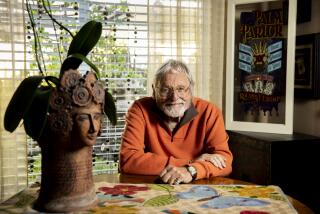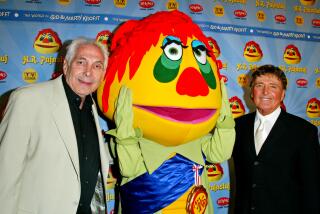Paul Tripp, 91; Father of ‘Tubby the Tuba’
- Share via
Paul Tripp, the actor, director, writer and lyricist who taught generations of children about orchestral instruments with his imaginative “Tubby the Tuba,” and about history and literature with his early children’s television show “Mr. I. Magination,” has died. He was 91.
Tripp died Thursday in Manhattan of causes associated with aging.
“Tubby” is the indelible story of a lonely, hapless little tuba who wanted his own melody but was assigned to limit himself forever to “oompah, oompah.” Derided as clumsy and overweight by the other instruments, he wanders off to the riverbank, meets a helpful bullfrog who teaches him an “oompah” melody, and then delights the rest of the orchestra with his new tune.
The moral and musical tale, often compared with a classical 1936 Prokofiev work, “Peter and the Wolf,” was first recorded by Tripp in 1945. It has been re-recorded over the decades, selling more than 8 million copies.
‘I Liked the Story’
The little saga has been performed live by orchestras around the world conducted by such legends as Eugene Ormandy, Leonard Bernstein and Arthur Fiedler. Translated into 30 languages, it has been narrated by Danny Kaye, Jose Ferrer, Carol Channing, Peter Ustinov and other actors and by the chef Julia Child, as well as by Tripp himself.
A “Tubby the Tuba” recording was nominated for a Grammy in 1966, and a 1983 animated film was nominated for a short subject Oscar.
“Some said it taught people music appreciation,” the then-octogenarian Tripp told the Bergen (N.J.) Record a few years ago, when “Tubby” celebrated its 50th anniversary. “All I know is, I liked the story and saw no reason why Tubby and I couldn’t continue for a long while.”
Tripp, a native New Yorker whose father was a singer and actor, was an accomplished actor when “Tubby” emerged to point him toward children’s educational entertainment.
He made his Broadway debut in “Cyrano de Bergerac” in 1936. Four years later, Tripp was performing in George Kleinsinger’s opera “Victory Against Heaven,” when he persuaded the composer to collaborate on his concept of “Tubby.”
The work was barely finished when Tripp was drafted in 1942, serving in the Army Signal Corps during World War II. Before being ordered to the China-Burma-India theater, he directed an Army production, “The Army, Play by Play.”
After the war, “Tubby” proved so successful that it became Tripp’s natural entree to the new medium of television.
In 1949, he launched his first children’s show, “Mr. I. Magination,” riding into living rooms on a toy train and wearing engineer’s striped overalls. The CBS show lasted three years and earned him a Peabody award.
Tripp--the creator, producer, director, writer and star--and his magic train would whisk viewers to Imagination Land with its intriguing cities Ambitionville, Inventorsville and I-Wish-I-Were Town.
A lifelong history buff, Tripp contrived his programs from stories in history and literature, introducing tykes to Rip Van Winkle, President Lincoln, sharpshooter Annie Oakley and circus impresario P.T. Barnum, among others.
‘I Wasn’t a Do-Gooder’
Joining Tripp in multiple roles for each half-hour episode was a small stock company, including his wife, actress Ruth Enders, and then-beginning actors Walter Matthau and Richard Boone.
“I never considered it educational,” Tripp said on the show’s 50th anniversary, echoing his “Tubby” comments. “I wasn’t a do-gooder. I just loved imparting information to people.”
Tripp went on to produce and star in “On the Carousel,” another CBS children’s educational variety program, from 1954 to 1959, earning an Emmy. Later, he starred in a third children’s show, the birthday-themed “Birthday House” for NBC from 1963 to 1967.
The prolific and eclectic entertainer wrote and published about 600 songs and wrote more than 30 record albums for children, including “Story of Celeste,” “Pee Wee the Piccolo” and “Good Night, Dear Lord,” recorded by Johnny Mathis.
Tripp also wrote four children’s books, including “The Strawman Who Smiled by Mistake” in 1967 and “The Little Red Flower” in 1968.
He rarely ventured into Hollywood, except for the 1966 feature film “The Christmas That Almost Wasn’t,” about a purported hijacking of Santa Claus. The film, directed by and starring Rossano Brazzi, marked the film debut for Tripp, who also starred as well as wrote the script and lyrics.
Tripp’s love of history placed him in several adult stage plays that also told fact-based stories. He played Ben Franklin, for example, in a touring company of “1776” that appeared at the Pasadena Civic Auditorium in 1971. He also toured in a one-man stage production of “Will Rogers, U.S.A.” in 1974 and, in 1980, performed a PBS one-man show on Thomas Edison.
The entertainer acted on several of the early live-television drama anthologies, including “Studio One,” “Kraft Television Theater” and “Philco Playhouse.”
Tripp attended what is now the City College of the City University of New York and studied law at Brooklyn College.
Widowed in 1999, Tripp is survived by a daughter, Suzanne Jurmain of Los Angeles; a son, David of Stuyvesant, N.Y.; and two grandchildren.
More to Read
The biggest entertainment stories
Get our big stories about Hollywood, film, television, music, arts, culture and more right in your inbox as soon as they publish.
You may occasionally receive promotional content from the Los Angeles Times.










